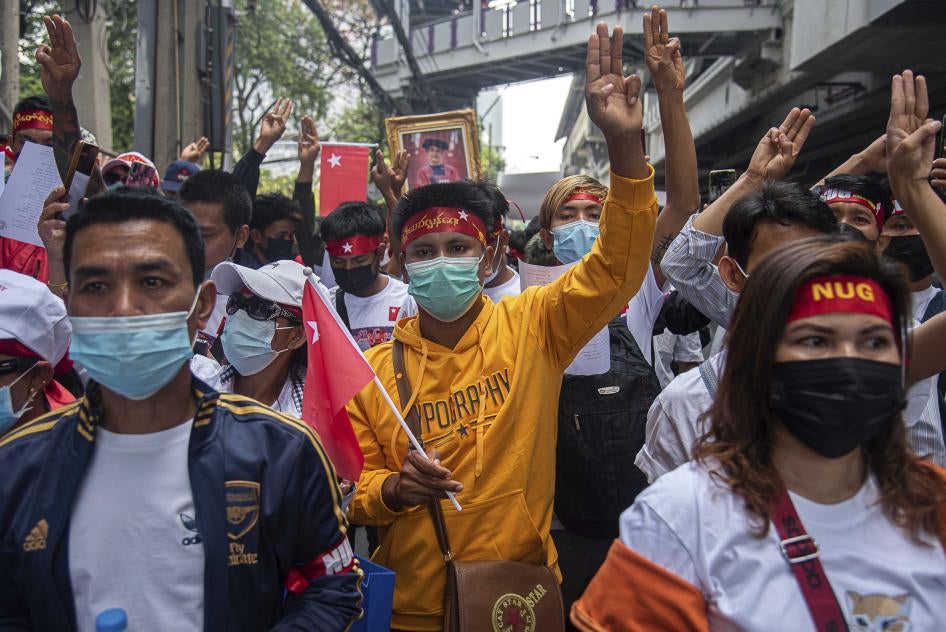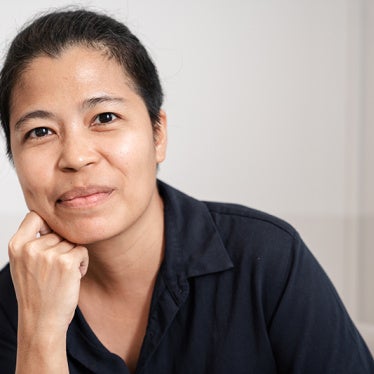Two years ago, in February 2021, Myanmar’s military carried out a coup, overthrowing a democratically elected government and detaining many of its leaders. Since then the junta’s security forces have engaged in a broad crackdown against opposition to military rule, committing numerous crimes against humanity and war crimes across the country, widely documented by Human Rights Watch and other groups.
France and the European Union have been vocal in condemning the military’s atrocities. The French government supported the United Nations General Assembly and UN Human Rights Council in 2021 in adopting resolutions calling on the military to end abuses and restore civilian rule. France also backed several rounds of EU economic sanctions and travel bans on senior military leaders and military-owned conglomerates that fund the military’s rule.
More recently, on December 21, France supported a UN Security Council resolution on Myanmar, denouncing the military’s rights violations since the coup. The resolution fell short of imposing a global arms embargo, but its adoption reflects the junta’s growing international isolation. The fact that Russia and China abstained instead of vetoing the resolution signals that even the junta’s few friends are losing interest in defending them.
None of this, however, has been enough to change the junta’s conduct or calculations. The military has continued to carry out mass killings, arbitrary arrests, torture, sexual violence, and military attacks on civilians in conflict areas. Since the coup, the military has detained at least 17,000 anti-coup protesters and killed over 2,800 demonstrators and bystanders. The military still blocks humanitarian aid from reaching millions of displaced people and others at risk, and in Rakhine State—where the ethnic Rohingya have faced years of crimes against humanity, including apartheid—security forces have imposed new restrictions on movement and aid, making food and water shortages worse and paving the way for increased preventable diseases and severe malnutrition.
The junta’s leaders may appear dismissive about their international reputation, but they may be more sensitive to an increased focus on their potential criminal liability. UN members should more stridently raise the prospect of jurisdiction over crimes against humanity by the International Criminal Court. Thus far, such calls have been inadequate to press the Security Council to vote for an ICC referral.
Another way to get the Myanmar junta’s attention would be for key governments to more effectively target the military’s economic lifeblood, in particular, foreign currency revenues that the military obtains from exports like natural gas, metals, gemstones, and timber—funds it uses to purchase weapons, military equipment, and fuel.
The economic sanctions imposed so far by the US, EU, and UK, which were meant to curtail these revenue streams, haven’t been tough enough—or been enforced enough—to meaningfully impact the junta. Asian countries such as Singapore and Japan that could help enforce these sanctions through anti-money laundering laws, have not done so. The junta evidently has not felt compelled to change its conduct.
In the most egregious example, banks continue to process and send to military-controlled entities US dollar revenues from natural gas exports to Thailand and China. This is due in part to the fact that the US and UK have not matched EU sanctions on the natural gas revenues—which are paid in USD, not Euros. France, Germany, and other EU members need to press the US and UK to impose matching sanctions.
Enforcement also needs to be ramped up. EU and Asian banks processing US dollar and Euro transactions continue to make payments to sanctioned entities. The US and EU continue to allow imports of valuable teak wood auctioned off by sanctioned entities. Meanwhile, several Japanese, Korean, and Singaporean companies and banks—many of them with multinational operations that place them in part under US and EU legal jurisdictions—have continued to do business with military-owned entities.
France and others often point to the Association of South East Asian Nations (ASEAN) as a means for resolving the crisis in Myanmar, even though the bloc has little power or cohesion. In April 2021, ASEAN did manage to negotiate a Five-Point Consensus with the Myanmar military, meant to lead to dialogue and de-escalation. But the military repudiated it within days and the abuses only increased. Since then, ASEAN has been unable to meaningfully impact the military’s decision making. When the junta executed four political prisoners in July 2022—Myanmar’s first use of the death penalty in over three decades—one ASEAN leader, Malaysia, called the executions a “mockery” of ASEAN’s efforts.
As China and Russia continue to shamefully block more robust multilateral action, France, together with other EU member states, should redouble efforts to coordinate with the US, EU at large and other Western and Asian parnters to ensure that sanctions are strengthened and enforced effectively. Tougher actions can stem the flow of foreign funding and curb the military’s ability to buy weapons and sustain its operations, and help ASEAN and other intermediaries convince them that they need to move away from brutality and start taking steps toward restoring democratic rule.
The status quo approach is not working. France and its European partners need to do more to stem the junta’s brutality and help the people of Myanmar, who continue to call for the international community to help.










